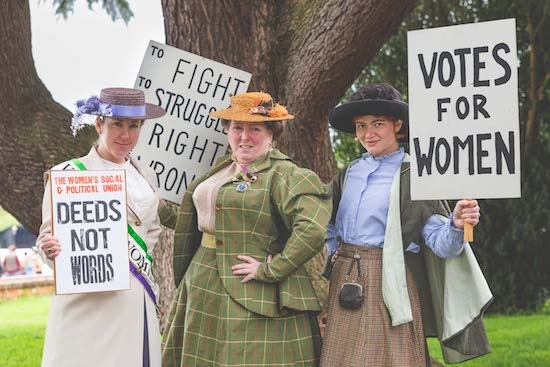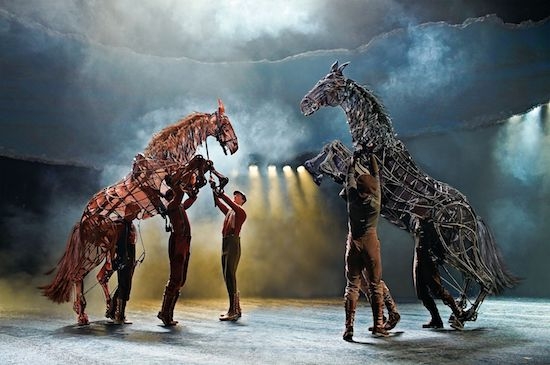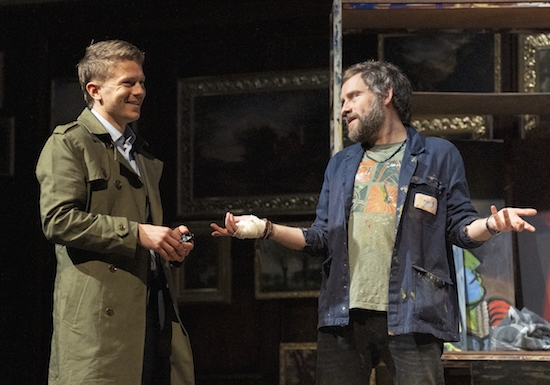Girl From The North Country is a heart-rending and heart-warming play that is harmoniously punctuated with soul-stirring music and lyrics.
Playwright Conor McPherson’s debut musical incorporates evocative songs selected from Bob Dylan’s enormous catalogue, writes Georgina Butler.
Folk-infused, bluesy, gospel tunes enhance the impact of this ensemble-driven drama, which weaves multiple storylines together to delicately spotlight universal themes: isolation, desperation, love, loss, longing, hope.
The setting is Duluth, Minnesota (where Dylan was born, in 1941) during the bleak winter of 1934.
The Great Depression is weighing heavily on the world, so poverty and insecurity are rife. The action takes place in a run-down guesthouse, owned by the Laine family. Nick Laine is struggling to care for his ailing wife, Elizabeth, (who appears to have early onset dementia) and manage the failing business. The dwelling is like a halfway house for all its inhabitants and effectively serves as a microcosm of America at the time.
Lost and lonely people drift through this guesthouse. They plonk themselves down at a piano, or hover by a free-standing microphone, to sing songs that poetically allude to unspoken suffering.
They articulate their anguish and listen for whispers of hope. As a result of intimate and intelligent staging, the music provides both an emotional release for individual characters and an emotionally charged atmosphere that resonates with the audience. It somehow transcends narrative and characterisation to express and encourage a deeper level of experience.
The orchestrations, by Simon Hale, rearrange twenty of Dylan’s songs as a sweeping soundscape of wistful solos, rousing hymns and the odd up-tempo hootenanny group number. The onstage band, The Howlin’ Winds, blows everyone away with storming music-making. It is a shame that the band is hidden in the shadows. However, the musicians' spectral silhouettes and the wavering, melancholic warbles of their instruments add to the sense of fragility manifested by the storytelling.
Follow Total MK on Facebook: here and twitter here for breaking news in Milton Keynes
Structurally, the songs illuminate disparate characters who are each striving to find light in an all-consuming darkness and stability in an unstable world. The musical interludes liberate these drifters and dreamers from the circumstances that stifle them.
When they are singing (always out to the audience rather than to each other, which conveys their lonely-and-in-limbo state) they are relishing being given a voice. And breathing space. The space to imagine facing their demons and deciphering their desires.
The introductory narration declares that “pain comes in all kinds: physical, spiritual and indescribable”.
It is duly made clear throughout the production that all the characters are suffering. There are a lot of restless, rootless, remarkably resilient people to keep track of!
Nick (Graham Kent) is tired yet tireless. Haunted by a freak accident during his childhood and harassed by concerns for his family and finances, he is desperately trying to secure a future for everyone under his roof. He is the only character who does not sing, which perhaps reflects his preoccupation with what problems tomorrow will bring and what can be done today to pre-empt them.
Elizabeth (Frances McNamee) is lost in a haze of confusion, through which she has found the freedom to say and do whatever she feels. Her mind wanders most of the time yet snaps back to lucidity at disconcerting moments. Gene (Gregor Milne) is the Laine’s son. He is a wannabe writer who is seriously struggling – not only with getting published, but also with alcoholism.
His inability to earn a living and lay off the booze is alienating him from his family and the love of his life, Katherine Draper (Eve Norris). Marianne (Justina Kehinde) is the Laine’s foundling daughter; a black girl who has been raised by a white family. She is pregnant and staying tight-lipped about the mysterious conception.
Mrs Neilsen (Maria Omakinwa) is a widow and long-term resident of the guesthouse. She is having a not-so-secret affair with Nick and keenly awaiting an inheritance from her late husband. The Burke family – Mr (James Staddon), Mrs (Rebecca Thornhill) and adult son Elias (Ross Carswell), a man–child who has a learning disability – is staying in the guesthouse after being displaced by errors of judgement.
Joe Scott (Joshua C Jackson) is a black boxer who was incarcerated for a crime he claims he did not commit. Reverend Marlowe (Eli James) is a shady, scheming bible salesman. Mr Perry (Teddy Kempner) is a widowed cobbler who is seeking companionship and always brandishing bunches of flowers.
Dr Walker (Chris McHallem), who is recovering from both the pain of his failed marriage and the morphine addiction he developed in an effort to numb that pain, seems to just be intrigued by everyone at the guesthouse. He provides occasional bursts of commentary to help us follow their stories of solitude and idiosyncratic cravings for connection.
The mild miasma of misery created in Girl From The North Country is mesmerising and the characters meander through situations like tumbleweeds being blown every which way. A tumbleweed is powerless to choose where it goes, it rolls wherever the wind pushes it, and fate really does seem to deal all these characters a cruel blow.
Nonetheless, the glimmers of hope and flashes of humour ensure this portrayal of Depression-era experiences is not overwhelmingly depressing. The takeaway is understated but uplifting.
The movement, by Lucy Hind, feels organic and appropriate for a slice-of-life drama. The characters, who are all very ordinary folk, dance socially at Thanksgiving. This is the only time they really seem to truly sing and dance together in this house of music, instead of retreating into their own reveries.
Low-key partnering sees individuals pair up for two-stepping and waltzing around the front room while turkey, drinks and revelations are served. In other scenes, cast members morph into tambourine-shaking, finger-clicking, sloping-and-swaying ghost dancers. They create an unobtrusive background of music-led movement, energising the shadows that follow each character.
Frances McNamee stands out as swearing, truth-telling Elizabeth. She has the voice to carry the sincerity needed for 'Like A Rolling Stone', the song that stands out as the show's anthem. And she has the presence and poise to embody Elizabeth's off-her-rocker mannerisms. This includes letting loose as the music temporarily whisks Elizabeth away from the reality of her "mad house".
Knowledge, or appreciation, of Dylan's work is not a pre-requisite for enjoying this musical. The lyrics, harmonies, aesthetics and ideas all blend beautifully. The performers seem to be emotionally and spiritually connected to the songs. The characterisation is clear. The interweaving storylines keep things interesting. However, with so many individuals to learn about and so many things left unsaid, you will find you have unanswered questions.
Perhaps the biggest question is: who is the girl from the north country? One of the female characters on the stage? One of the ghosts from the past? One meaningless memory, fleetingly expressed through a song?
The loose ends will leave you thinking, but that is no bad thing. This show is a musing, musical, mood piece. It hits you with the message that you do need to feel pain to heal it, but life just is messy and uncertain. No one has all the answers.
Whoever the girl from the north country may be, she would surely want everyone to grasp happiness where they can in the here and now. Better to live wholeheartedly through a difficult present than settle halfheartedly in the shadows.
Girl From The North Country continues at Milton Keynes Theatre until Saturday 19 November.
Georgina Butler is an editor, a dance writer and a ballet teacher. Click here and follow her on Twitter @GeorginaLButler and Instagram @glbdancewriter

















